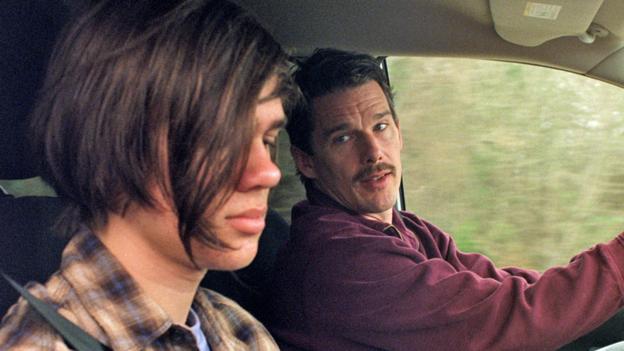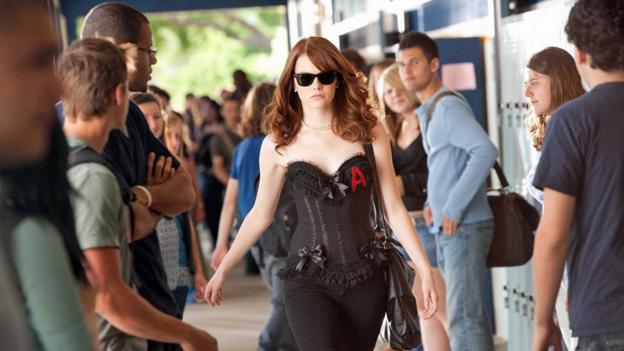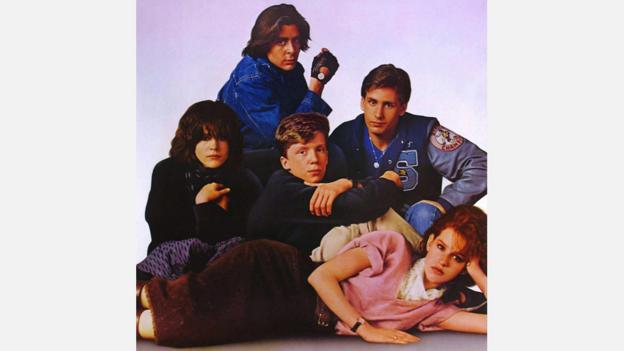The John Hughes teen classic turns 30, but does it have anything to say to today’s adolescents? University student Henry Knight investigates.
The orbits of ‘coming-of-age’ epics old and new collide this February as Richard Linklater’s Boyhood competes to win the Oscar for best picture while cult classic The Breakfast Club celebrates its 30th anniversary. Linklater’s meditation on ageing traces the evolution of Mason Jr. over 12 years. John Hughes’ high school drama, set during a single Saturday detention, only hints at the kind of backstory fleshed out so rigorously in Linklater’s marathon. Watching The Breakfast Club next to Boyhood makes you ask, “How did we get here?” But even if it feels rudimentary by the standards of Linklater’s film – using language and references opaque to today’s adolescents – the film still resonates in unexpected ways.
The Hughes classic employs the mandatory detention as a plot device to weave five high school strangers – a ‘Jock’, a ‘Princess’, a ‘Criminal’, a ‘Brain’ and a ‘basket case’ – into one motley crew. And it communicates in a vernacular that would mystify any US high school student now. Today’s misfits would stifle laughter, rather than quake in fear, at the insult “neo-maxi-zoon-dweebie” hissed by John Bender, the Criminal, at Brian, the Brain. His quips strike a funny chord today more for obscurity than for wit: this way of speaking has fallen so far out of vogue that it has regained a comic edge. What exactly is a ‘brownie hound’? I have no idea but I know it can be applied to vice principal Vernon, who relishes the prospect of “cracking skulls” if any of his students step out of line.

When the Jock character wrestles with Bender for alpha male status, he threatens to “total” him for harassing the Princess (Molly Ringwald). But when he gropes for a biting retort to one of Bender’s zingers the best he can come up with is “buttface”.
And while it’s unsurprising to see the Brain bristle at the sight of marijuana, the Jock, the Princess and the Brain also demonise the Criminal for smoking. It’s hard to imagine today’s teenagers would be so puritanical. The attitude of The Breakfast Club reflects a Reagan-era adolescence in which “burning” was steeped in stigma.
Ageing well?
The Breakfast Club speaks a dead language, and it runs the risk of modern audiences seeing it as a fossil of the remote past. But underneath the 1980s aesthetic, the story remains relevant 30 years later.
It unearths the tension of adolescent sexuality in frank and funny terms – especially the shaming of virginity. When Bender tries to expose Brian’s inexperience, the Brain claims to have “laid lots of times” with a Canadian girl he met at Niagara Falls. “You wouldn’t know her.” This scene bears a resemblance to one in Boyhood In which Mason Jr spends a night camping with a friend and his older brother. Faced with the same sort of flack, he claims to have slept with a girl named Jennifer, “she doesn’t live here though: it was back in Houston.”

Ally Sheedy’s brilliant performance as Allison reminds us of the difficulties teenage girls face in navigating the high school binary distinctions of ‘prude’ and ‘slut’. Emma Stone’s character grapples with that same ‘slut shaming’ trap 25 years later in Easy A.
Allison suggests an abusive and “unsatisfying home life”, with parents who ignore her. She dreams of fleeing to Israel, Africa, Afghanistan, anywhere but her home in Illinois. “Everyone’s home life is unsatisfying,” retorts Andy. “If it wasn’t, people would live with their parents forever.” It’s a truth we witness 30 years later in Boyhood, when Mason Jr’s mom breaks down in tears to see him so happy to leave the nest for college after she’s overcome so much to raise him.
Above all else, The Breakfast Club subverts the stereotyped narratives it bands together, fashioning characters out of caricatures. It shows us that teenagers are complex human beings who can’t just be categorised by adults bent on controlling them. It’s a manifesto against the Vice Principal Vernons of the world, who in Brian’s words, “see us as you want to see us, in the simplest terms, with the most convenient definitions”. Brain, Jock, Princess, Basket Case, Criminal – these categories are constructed for purposes of a stability and predictability ill-suited for teenagers, who traffic in volatility and experimentation. As a rebuttal of these mass-reproducible moulds, the film reminds us that the cement of identity never really dries.
While that message still resonates 30 years later, it’s hard to imagine anyone shooting The Breakfast Club today. The Saturday detention is an antiquated, single location setting that might struggle to hold the attention of modern audiences. None of the characters feel contemporary, least of all Bender, whose strong-arming the plot largely depends on for its movement. Recent coming-of-age films have depicted the stories of more reserved teenagers: Paulie Bleeker from Juno, McLovin’ from Superbad, Charlie from Perks of Being a Wallflower. That character type would be an awkward fit for The Breakfast Club.

A modern remake would have to rewrite the backstories by which the Club convenes in the first place. In a post-Columbine massacre world, Brian’s attempted suicide by flare gun would warrant expulsion and a one-way ticket to juvenile detention, not a Saturday slap on the wrist. As anti-bullying taskforces convene nationwide, Andy’s crime – “taping Larry Lester’s buns together” – today could earn him assault or sexual misconduct charges. Then again, his wrestling coach might strike a plea bargain with the administration behind closed doors just so he could keep competing. For pulling the fire alarm, Bender’s wolf-crying ways would justify a long-term suspension. By contemporary standards, detention isn’t the punishment for any of these crimes.
The Breakfast Club, like its lovable cast, now finds itself at an awkward stage. It resists both seamless translation into the present and interpretations that bill it as a fossil of the ‘80s. There’s a complexity to the script that cannot be reduced, as the monologue that starts and ends the film says, “to simple terms or convenient definitions”.
Coming-of-age cinema has itself come of age in the cutting edge realism of Boyhood. But the genre’s evolution owes much to the authenticity of The Breakfast Club, even if the film no longer feels real.
Email us: emmzzymikel007@gmail.com
DROP A COMMENT ALSO DONT FORGET TO SHARE WITH THE SHARE BOTTON BLOW!








0 comments:
Post a Comment